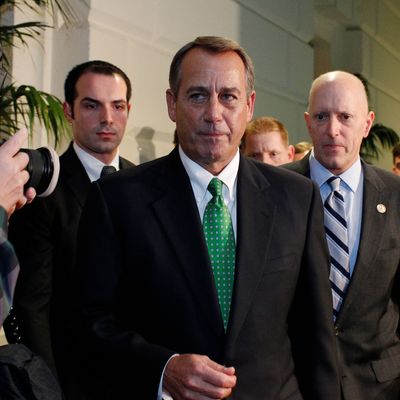
House Republicans have been meeting to figure out their next strategy on the debt ceiling. The last time, if you recall, President Obama insisted he would not pay a ransom in order to get the House Republicans to do something they agreed had to be done to avert financial catastrophe. They managed to save face by lifting the debt ceiling and attaching a requirement that the Senate pass a formal budget rather than just continue previous budgets. At the time, Republicans hailed this as a great victory, which would force Senate Democrats to negotiate a budget on favorable terms for the GOP.
But Republicans have since figured out that regular order is actually really bad for them, forcing them to openly advocate unpopular policy priorities on taxes and spending, and have been trying desperately to stall to prevent the very thing they once demanded. Now as they contemplate the next debt-ceiling hike, nobody in the party is even pretending that they won anything by making Senate Democrats draw up a formal budget. (“They say they will not simply roll over again, as they did in January,” reports the Washington Post.)
Numerous reports have covered the House GOP’s open strategy session, in which dozens of members offered strategy suggestions ranging from the wacky to the truly deranged. The most entertaining dispatches have been filed by National Review’s Jonathan Strong, whose ideologically sympatico style manages to capture the insane-asylum atmosphere without any apparent effort to do so.
One dynamic that comes through is that, even though the deficit is plunging at an extraordinarily fast rate, and saving the Republic from the supposed imminent threat of the debt crisis was the entire rationale for using the novel and dangerous tactic of holding the debt ceiling hostage, absolutely nobody within the House Republican caucus is even considering just lifting the debt ceiling. Everybody agrees they must demand a new hostage. The proposed demands change from tax reform to spending cuts to delaying Obamacare to the Keystone pipeline to the Paul Ryan budget to banning certain types of abortion.
Despite a lack of anything approaching consensus on what to demand for sparing the world from potential economic meltdown, numerous Republicans have proposed insisting that any plan they approve enjoy the support of every single House Republican, as opposed to merely the 218 needed for passage. “That could make an already difficult job for whip Kevin McCarthy (Calif.) even harder,” notes Strong drily. Well, yes. Previously, House Republicans have found themselves unable to pass bills that were far too radical to stand any chance in the Senate because they amounted to too much of a compromise for its most radical wing.
Somehow, a number of them have decided that the solution to the problem of none of them agreeing on what to do is to force every single one of them to agree. “We may have 233 different ideas, but we’re going to have impact if all 233 of us come together and do something,” a senior House GOP aide tells The Wall Street Journal.
Obama continues to state that he won’t agree to any policy concession in return for lifting the debt ceiling. The administration view is that entangling a necessary step for averting fiscal calamity with contentious policy negotiations is to play chicken with the world economy — Obama has to put a stop to the ransom process he acceded to in 2011, not merely because he finds the concessions themselves noxious but because the mere process of negotiating over them introduces massive systemic risk.
None of the reports of the House GOP meeting describe any members acknowledging, let alone grappling with, Obama’s stance. This is the funniest aspect of the whole dynamic. Sure, maybe Obama is bluffing, and maybe Republicans can force him to go along with signing the Paul Ryan budget or something rather than risk economic catastrophe. Probably not, but maybe. In any case, what they have to figure out is what happens after they pass their ransom bill and the Senate then refuses to pass it, and the debt ceiling deadline approaches. That’s when the real negotiation starts.
But none of the reports give any indication that Republicans are contemplating this reaction. Their whole thought process seems to extend to coming up with a ransom demand and assuming Obama agrees to it. The most likely way this plays out is that Obama and the Senate don’t agree to the ransom, the debt ceiling looms, business leaders freak out at Republicans, ultra-conservatives freak out at John Boehner, Boehner starts crying and maybe quoting prayers, and then they fold and lift the debt ceiling with Democratic votes.
If I were the House Republicans, I’d be thinking about that scenario and working backward toward a better outcome. Instead, they’re going with the Jacobin Town Hall approach. I don’t get it.






























